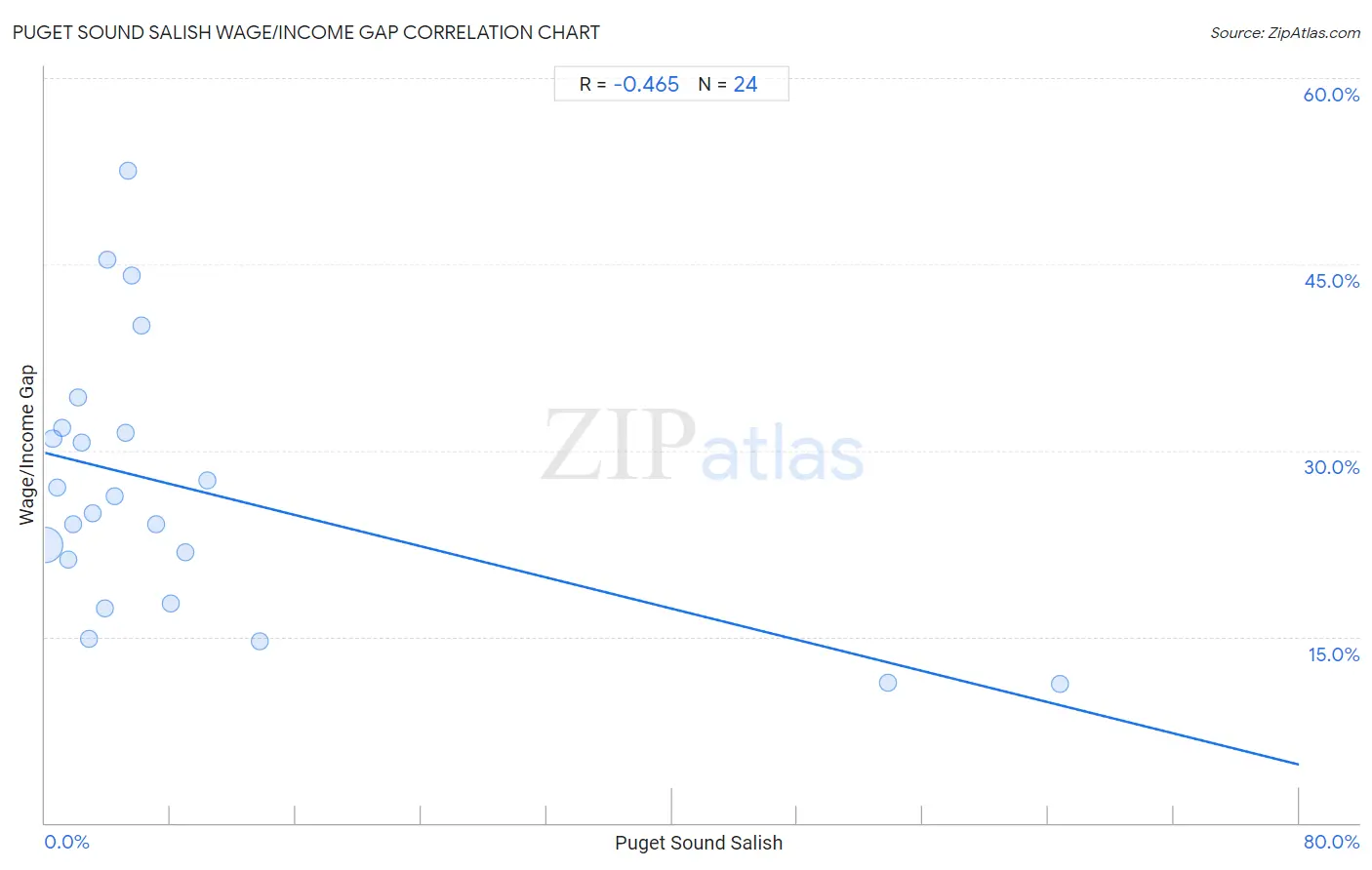Puget Sound Salish Wage/Income Gap
COMPARE
Puget Sound Salish
Select to Compare
Wage/Income Gap
Puget Sound Salish Wage/Income Gap
25.3%
WAGE/INCOME GAP
73.0/ 100
METRIC RATING
159th/ 347
METRIC RANK
Puget Sound Salish Wage/Income Gap Correlation Chart
The statistical analysis conducted on geographies consisting of 46,141,499 people shows a moderate negative correlation between the proportion of Puget Sound Salish and wage/income gap percentage in the United States with a correlation coefficient (R) of -0.465 and weighted average of 25.3%. On average, for every 1% (one percent) increase in Puget Sound Salish within a typical geography, there is a decrease of 0.31% in wage/income gap percentage.

It is essential to understand that the correlation between the percentage of Puget Sound Salish and wage/income gap percentage does not imply a direct cause-and-effect relationship. It remains uncertain whether the presence of Puget Sound Salish influences an upward or downward trend in the level of wage/income gap percentage within an area, or if Puget Sound Salish simply ended up residing in those areas with higher or lower levels of wage/income gap percentage due to other factors.
Demographics Similar to Puget Sound Salish by Wage/Income Gap
In terms of wage/income gap, the demographic groups most similar to Puget Sound Salish are French American Indian (25.4%, a difference of 0.040%), Immigrants from Zimbabwe (25.3%, a difference of 0.060%), Costa Rican (25.3%, a difference of 0.24%), Albanian (25.4%, a difference of 0.29%), and Immigrants from Mexico (25.3%, a difference of 0.30%).
| Demographics | Rating | Rank | Wage/Income Gap |
| Uruguayans | 81.3 /100 | #152 | Excellent 25.2% |
| Blackfeet | 78.1 /100 | #153 | Good 25.2% |
| Immigrants from Northern Africa | 78.1 /100 | #154 | Good 25.2% |
| Immigrants from Vietnam | 77.7 /100 | #155 | Good 25.2% |
| Immigrants from Mexico | 76.4 /100 | #156 | Good 25.3% |
| Costa Ricans | 75.8 /100 | #157 | Good 25.3% |
| Immigrants from Zimbabwe | 73.7 /100 | #158 | Good 25.3% |
| Puget Sound Salish | 73.0 /100 | #159 | Good 25.3% |
| French American Indians | 72.5 /100 | #160 | Good 25.4% |
| Albanians | 69.4 /100 | #161 | Good 25.4% |
| Shoshone | 69.0 /100 | #162 | Good 25.4% |
| Native Hawaiians | 69.0 /100 | #163 | Good 25.4% |
| Koreans | 68.6 /100 | #164 | Good 25.4% |
| Immigrants from Hong Kong | 64.0 /100 | #165 | Good 25.5% |
| Immigrants from Ukraine | 63.8 /100 | #166 | Good 25.5% |
Puget Sound Salish Wage/Income Gap Correlation Summary
| Measurement | Puget Sound Salish Data | Wage/Income Gap Data |
| Minimum | 0.031% | 11.2% |
| Maximum | 64.8% | 52.5% |
| Range | 64.7% | 41.3% |
| Mean | 9.0% | 27.0% |
| Median | 4.2% | 25.6% |
| Interquartile 25% (IQ1) | 1.9% | 19.5% |
| Interquartile 75% (IQ3) | 7.5% | 31.7% |
| Interquartile Range (IQR) | 5.6% | 12.2% |
| Standard Deviation (Sample) | 15.9% | 10.7% |
| Standard Deviation (Population) | 15.6% | 10.5% |
Correlation Details
| Puget Sound Salish Percentile | Sample Size | Wage/Income Gap |
[ 0.0% - 0.5% ] 0.031% | 43,376,840 | 22.4% |
[ 0.0% - 0.5% ] 0.48% | 1,432,717 | 31.0% |
[ 0.5% - 1.0% ] 0.75% | 626,725 | 27.0% |
[ 1.0% - 1.5% ] 1.07% | 226,151 | 31.8% |
[ 1.5% - 2.0% ] 1.51% | 121,411 | 21.2% |
[ 1.5% - 2.0% ] 1.81% | 132,853 | 24.1% |
[ 2.0% - 2.5% ] 2.08% | 67,849 | 34.3% |
[ 2.0% - 2.5% ] 2.35% | 19,733 | 30.6% |
[ 2.5% - 3.0% ] 2.81% | 37,065 | 14.9% |
[ 3.0% - 3.5% ] 3.03% | 44,850 | 24.9% |
[ 3.5% - 4.0% ] 3.77% | 2,040 | 17.3% |
[ 3.5% - 4.0% ] 3.95% | 734 | 45.4% |
[ 4.0% - 4.5% ] 4.44% | 2,185 | 26.3% |
[ 5.0% - 5.5% ] 5.14% | 2,041 | 31.5% |
[ 5.0% - 5.5% ] 5.29% | 416 | 52.5% |
[ 5.5% - 6.0% ] 5.56% | 90 | 44.0% |
[ 6.0% - 6.5% ] 6.18% | 3,284 | 40.0% |
[ 7.0% - 7.5% ] 7.09% | 30,262 | 24.1% |
[ 8.0% - 8.5% ] 8.00% | 1,000 | 17.7% |
[ 8.5% - 9.0% ] 8.96% | 3,203 | 21.8% |
[ 10.0% - 10.5% ] 10.33% | 4,329 | 27.6% |
[ 13.5% - 14.0% ] 13.67% | 4,484 | 14.6% |
[ 53.5% - 54.0% ] 53.79% | 593 | 11.3% |
[ 64.5% - 65.0% ] 64.75% | 644 | 11.2% |